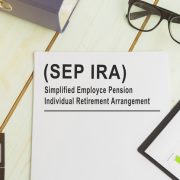Exploring Self-Directed SEP IRAs for Real Estate Agents
If you’re a real estate agent, you know one investment asset very well. You know where the value is. You know how to spot deals. You know all sorts of things about real estate—but you don’t feel like you get to use that knowledge when it comes to your retirement. But what if there was a way to use your knowledge as a real estate agent to build a retirement nest egg faster than you might imagine? One key strategy is using Self-Directed SEP IRAs. IRAs for real estate agents can be especially beneficial because they help you sock away money while using your key area of expertise: the land around you.
Why Self-Directed SEP IRAs for Real Estate Agents?
First, let’s define what the Self-Directed SEP IRA is. This is a retirement account in which self-employed individuals—yep, that includes real estate agents—can contribute pre-tax income towards retirement. And when you direct your own SEP IRA, you can use alternative assets within that IRA, including real estate. While you can’t use any properties that may benefit your personal life or business life in the immediate future—this is a retirement account, after all—this approach allows you to use a SEP IRA to invest in a style of property with which you have tons of familiarity. It’s your “home turf,” so to speak.
A SEP IRA is nice because it allows for higher contribution limits. But the “self-directed” element is what sets this SEP IRA apart from more traditional retirement accounts. A Self-Directed SEP IRA allows for a broader range of investment options, including real estate, private loans, precious metals, and other alternative investments. For real estate agents, this is an especially appealing feature—you know real estate, after all, and it’s familiar to you.
The Benefits of Self-Directed IRAs for Real Estate Agents
Benefit #1: Tax Advantages
One of the key benefits of a Self-Directed SEP IRA is the tax advantage. That’s why people invest in retirement accounts, after all. With a SEP IRA, contributions are tax-deductible, which reduces your taxable income for the year. Any earnings within the account grow tax-deferred, meaning you won’t pay taxes on capital gains or rental income generated by properties held in the SEP IRA until you start taking withdrawals in retirement.
Benefit #2: Real Estate Investing
Simply put? A Self-Directed SEP IRA lets you invest directly in real estate. This is a key advantage for real estate agents: you can leverage your knowledge and expertise to grow your retirement savings. That isn’t to say that you can use inside knowledge with specific properties for your retirement account, however—you have to be careful to keep your retirement assets separate from your personal or professional work.
Benefit #3: Higher Contribution Limits
Self-employed individuals can contribute much more to a SEP IRA than to a traditional IRA or Roth IRA. The higher contribution limits allow real estate agents to build their retirement funds more quickly. For those who have inconsistent income, this is particularly helpful, as you can contribute more in years when your earnings are higher, and adjust accordingly in slower years.
Ultimately, Self-Directed SEP IRAs can be an ideal vehicle for real estate agents. You can leverage your real estate knowledge to build a nest egg in your retirement account—giving you far more confidence in the way you set aside money for retirement. Interested in learning more about Self-Directed IRAs? Contact American IRA, LLC at 866-7500-IRA (472) for a free consultation. Download our free guides or visit us online at www.AmericanIRA.com.










